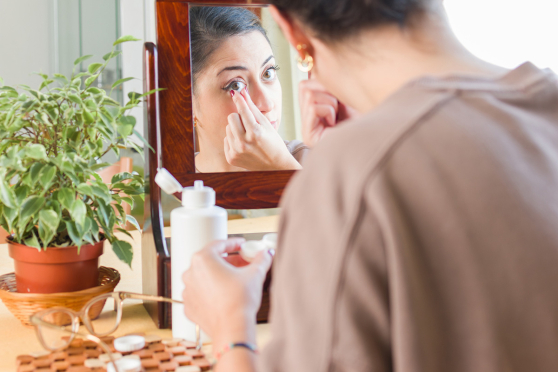Should I take dietary supplements to protect my vision?
Vitamins and minerals play an important role in eye health. Find out which ones are best — and how to incorporate them into your diet.

There’s no question that vitamins and minerals are important for your overall health and well-being. That’s why, if you head to your local drugstore or supermarket, you’ll see supplements promising all kinds of health benefits — including healthier eyes. But can vision supplements actually help promote better vision? Yes and no.
When it comes to healthy eyes and clear vision, a balanced diet is the best way to get the vitamins your eyes — and your body — need.1, 2 But some supplements can also play an important role in eye health.
Another way to get clearer vision? LASIK surgery. UnitedHealthcare Vision members get up to 35% off laser vision correction services. Schedule a free exam today!
Nutrition impacts eye health
“Nutrition plays a big role in overall health, including your vision,” says Ronald L. Benner, O.D., the immediate past president of the American Optometric Association. It’s no surprise that what’s good for your whole body is good for your eyes too. Eating plenty of vegetables, fruits and whole grains may help support eye health.1, 2
But supplements are not a cure for eye disease. “They will not give you back vision you have already lost,” says Dianna Seldomridge, M.D., a clinical spokesperson for the American Academy of Ophthalmology.
Critical nutrients for healthy eyes
Certain nutrients are especially good for your eyes. To protect your vision, make sure you’re getting enough of these essential vitamins and nutrients:
Beta-carotene
The age-old advice to eat carrots for eye health turns out to be true. Beta-carotene, the pigment that gives carrots their orange hue, may help prevent night blindness and age-related macular degeneration (AMD).3 AMD is an eye disease that can cause vision loss.4
Where to find it: Carrots, sweet potatoes, leafy green vegetables, broccoli, winter squash5
Lutein and zeaxanthin
These powerful antioxidants may help lower the risk of AMD and cataracts.1, 6
Where to find them: Kale, spinach, broccoli, Swiss chard, peas, asparagus1, 2
Vitamin C
Some studies suggest that vitamin C may lower the risk of cataracts and slow the advance of AMD, when taken in combination with other essential nutrients.7
Where to find it: Citrus fruits, red and green peppers, strawberries, tomatoes8
Omega-3 fatty acids
“Research shows omega-3 fatty acids are important for proper visual development and retinal function,” says Dr. Benner.7
Where to find them: Salmon, sardines, walnuts, soybean oil9
Zinc
This mineral helps in the production of melanin, the protective pigment in the eye.7
Where to find it: Oysters, beef, fortified cereal, brown rice, pumpkin seeds10
“Since the body doesn’t make these nutrients naturally, it’s important that they are incorporated into your diet,” says Dr. Benner.
Studies suggests that getting nutrients from eating real food is more beneficial to your health than trying to get vitamins and nutrients in pill form.1, 11 But supplements can help people get essential nutrients if they don’t eat enough healthy foods.12
Keep in mind that it’s important to speak to your doctor before taking any supplement. Some supplements can interact with medications or have other harmful effects on your health.12
When supplements can help
Most healthy people don’t need supplements for eye health.1,2 But there are a few instances where supplements can come in handy.
Treating vitamin deficiencies
When you lack certain vitamins, your eyes may be affected. You could develop eye problems if you don’t get enough of the following:
- Vitamin A. “Vitamin A deficiency can cause blindness,” says Dr. Seldomridge. In fact, it’s the leading cause of preventable blindness in children worldwide.13
- Vitamin D. If you’re low in vitamin D, you run the risk of developing dry eye syndrome, diabetic retinopathy and AMD.14
- Vitamin C. Broken blood vessels in the eyes, as well as decreased healing of wounds in the cornea (the outermost clear layer of the eye), are linked to vitamin C deficiencies.5,16
Treating age-related macular degeneration
Age-related macular degeneration occurs when a part of your retina called the macula is damaged. Since the macula controls sharp, central vision, damage can lead to blurring and difficulty seeing close up.4
A combination of vitamins called AREDS 2 has been shown to slow the progression of AMD in some patients.2, 17 These supplements contain:
- Vitamin C
- Vitamin E
- Lutein
- Zeaxanthin
- Zinc
- Copper (cupric oxide)
A healthy, balanced diet is always the first step toward healthy eyes — and a healthy body. But if you aren’t getting enough of what you need in your diet, or if you have age-related macular degeneration, supplements may be able to help.
Looking for a new eye care provider? Search the UnitedHealthcare Vision Network now.
Sources:
- 36 fabulous foods to boost eye health American Academy of Ophthalmology, April 2023. Accessed October 2, 2023.
- Diet and nutrition American Optometric Association, Accessed October 2, 2023.
- Foods for eye health Academy of Nutrition and Dietetics, last reviewed May 2023. Accessed October 2, 2023.
- Age-related macular degeneration (AMD) National Eye Institute, last reviewed June 2021. Accessed October 2, 2023.
- Drugs and supplements: Beta carotene (oral route) Mayo Clinic, last reviewed February 2023. Accessed October 2, 2023.
- Lutein and zeaxanthin and their roles in age-related macular degeneration — neurodegenerative disease Nutrients, February 2022. Accessed October 2, 2023.
- Diet and nutrition American Optometric Association. Accessed October 2, 2023.
- Vitamin C National Institutes of Health, last updated March 2021. Accessed October 2, 2023.
- Omega-3 fatty acids National Institutes of Health, last updated February 2023. Accessed October 2, 2023.
- Zinc National Institutes of Health, last updated October 2022. Accessed October 2, 2023.
- Association between dietary supplement use, nutrient intake, and mortality among U.S. adults: a cohort study Annals of Internal Medicine, April 2019. Accessed October 2, 2023.
- Dietary supplements: What you need to know National Institutes of Health, last updated January 2023. Accessed October 2, 2023.
- What is vitamin A deficiency? American Academy of Ophthalmology, May 2023. Accessed October 2, 2023.
- Vitamin D and ocular diseases: a systematic review International Journal of Molecular Sciences, April 2022. Accessed October 2, 2023.
- Anatomy, head and neck, eye cornea National Library of Medicine, StatPearls, last updated August 2023. Accessed October 2, 2023.
- Ocular manifestations of vitamin C deficiency American Academy of Ophthalmology, EyeWiki, January 2023. Accessed October 2, 2023.
- AREDS 2 supplements for age-related macular degeneration (AMD) National Eye Institute, last updated June 2021. Accessed October 2, 2023.


